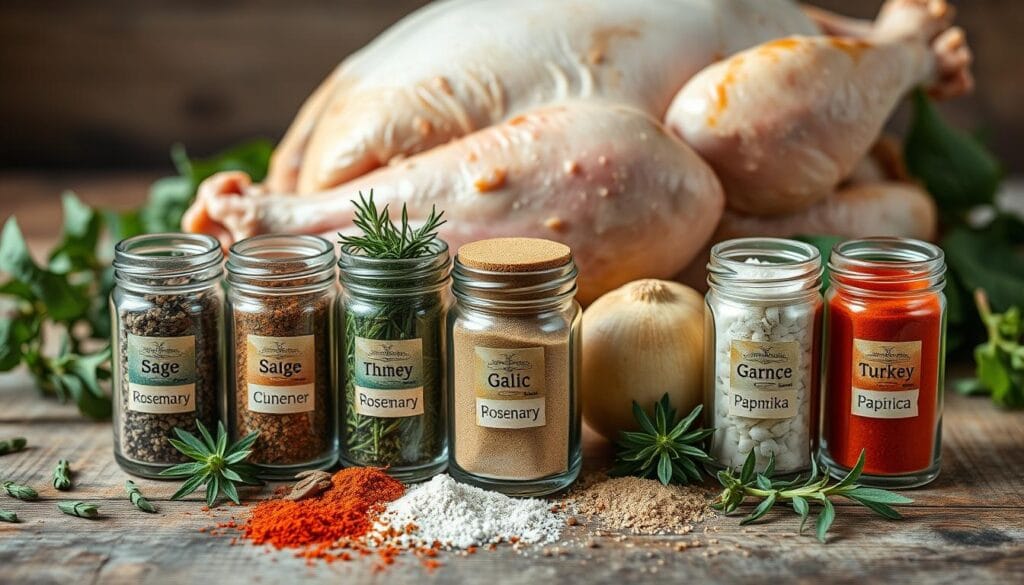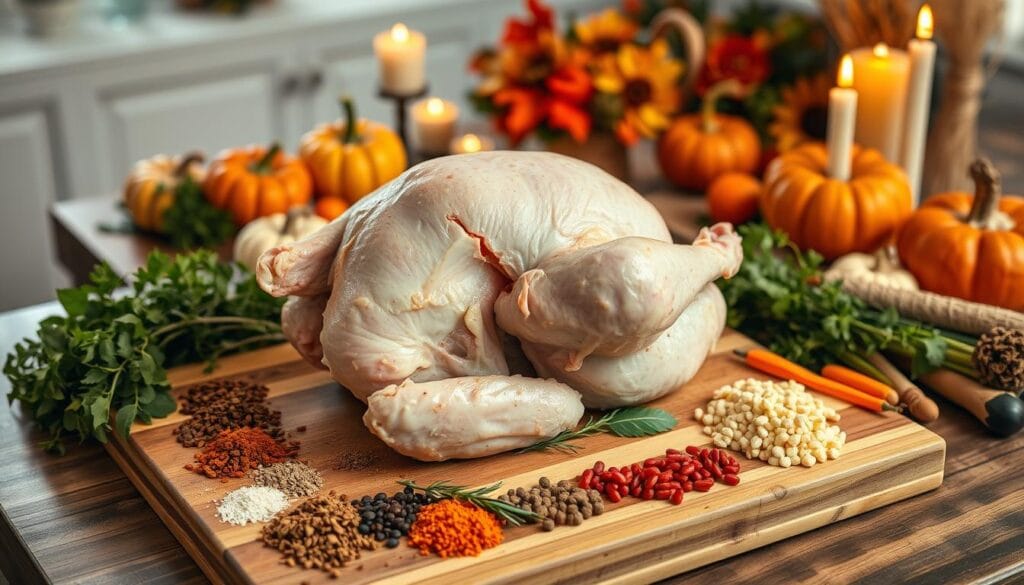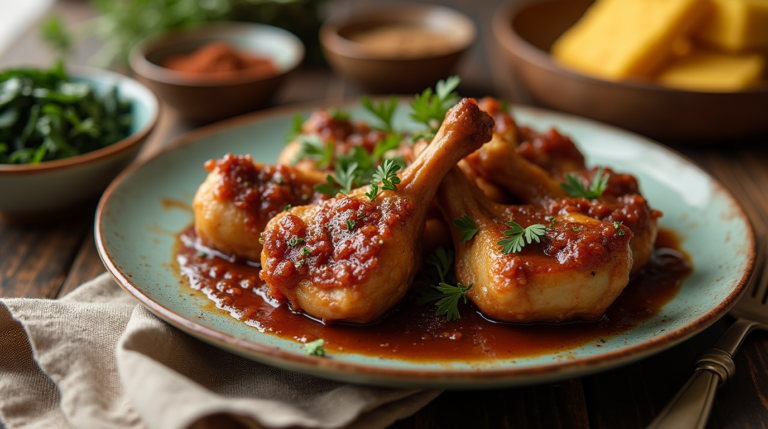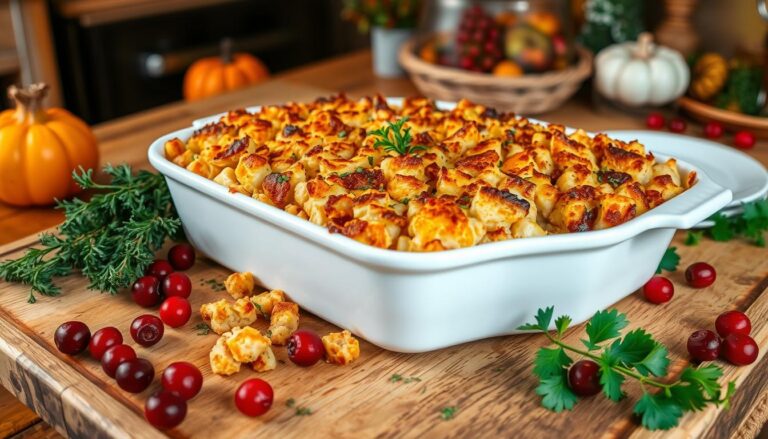Turkey rub: Essential spices for a flavorful bird.
As autumn arrives, the kitchen fills with the aroma of roasting turkey. The secret to a memorable holiday feast lies in the perfect turkey rub. This blend of spices unlocks your bird’s natural flavors, making it a dish to remember.
Table of Contents
Understanding the Basics of Turkey Seasoning
Getting your turkey ready for the holidays starts with seasoning. Salt and base spices are key to a tasty turkey. Use coarse kosher salt for even seasoning and juicy meat. Remember, different salts have different salt levels.
Base spices like chili powder and paprika add flavor without too much heat. They work together to bring out the turkey’s natural taste. Good seasoning turns a plain turkey into a feast.
The Role of Salt and Base Spices
Salt is crucial for keeping the turkey moist and enhancing its flavor. Coarse kosher salt spreads evenly, ensuring all parts are seasoned. It also makes the meat tender and juicy.
Why Proper Seasoning Matters
Seasoning your turkey right makes your holiday meal unforgettable. It brings out the turkey’s natural flavors, making every bite a delight. Your guests will love the savory and aromatic notes.
Difference Between Wet and Dry Rubs
You can season your turkey with wet or dry rubs. Wet rubs use butter or oil for a glossy skin. Dry rubs are just spices and herbs on the turkey. Both methods can make your turkey delicious, so try what you like best.
“Proper seasoning is the difference between a good turkey and a great one. It’s the key to unlocking the full potential of your holiday centerpiece.”
Essential Ingredients for the Perfect Turkey Rub
Making the ultimate turkey seasoning blend is key to a delicious, flavorful bird. The secret is in choosing the right herbs and spices. You’ll need coarse kosher salt, chili powder, and both smoked and sweet paprika. Also, ground black pepper, onion powder, garlic powder, and a bit of cayenne pepper for heat.
To make the perfect turkey rub, mix these ingredients carefully. Use one tablespoon of the blend for every two pounds of turkey. The recipe makes seven tablespoons, perfect for a 12-15 pound bird. For turkey pieces like wings or legs, use 1-2 teaspoons. A single breast needs 1 tablespoon.
The homemade spice rub keeps well for up to 3 months in an airtight container. Or, freeze it for up to 6 months. You can use fresh herbs instead of dried ones, but use double the amount since dried herbs are stronger.
| Ingredient | Amount |
|---|---|
| Coarse Kosher Salt | 2 tablespoons |
| Chili Powder | 1 tablespoon |
| Smoked Paprika | 1 tablespoon |
| Sweet Paprika | 1 tablespoon |
| Ground Black Pepper | 1 tablespoon |
| Onion Powder | 1 teaspoon |
| Garlic Powder | 1 teaspoon |
| Cayenne Pepper (optional) | 1/2 teaspoon |
With these turkey seasoning ingredients, you’re ready to make an amazing herb butter for turkey.
Creating Your Signature Turkey Rub Blend
Making the perfect homemade turkey rub is an art. It lets you add delicious flavors to your turkey. You can choose from classic or unique spice mixes. The key is to use quality ingredients and follow a few easy steps.
Measuring and Mixing Techniques
Measuring and mixing your turkey rub is easy. You can use exact amounts or just guess, depending on your turkey’s size. A good rule of thumb is 1 teaspoon of rub per pound of turkey. But, you can adjust it to taste.
To make your spice blend, mix all ingredients in a bowl. This spreads the flavors evenly. It helps the seasoning get into the turkey well.
Customizing Your Spice Blend
One of the best things about homemade turkey rub is you can make it your own. Try different spice levels by changing chili powder, cayenne, or black pepper amounts. Add lemon zest, fresh herbs, or brown sugar for a unique flavor.
Storage Tips for Homemade Rubs
Storing your homemade turkey rub right is key. Put it in an airtight container and keep it in a cool, dry spot. This way, your rub will stay fresh for 6-12 months. You can enjoy it all holiday season and more.
“A great turkey rub can turn a simple turkey into a feast. Try different spice mixes to find your favorite.”
How to Apply Your Turkey Rub for Maximum Flavor
Applying your homemade turkey seasoning or dry rub for turkey is key to a flavorful Thanksgiving turkey. The method you choose depends on how you cook it.
For a fried turkey, use a dry rub. Dry the turkey skin with paper towels. Then, apply the rub all over, including the cavity. This will make a tasty crust as it cooks.
Roasting your turkey? Go for a wet rub. Mix your spices with melted butter or olive oil. Rub this paste under the skin for even flavor.
“Utilizing compound butter with ingredients like fresh herbs or citrus zest is suggested for added flavor.”
Make sure to spread the turkey seasoning or dry rub for turkey evenly. This includes the cavity. This way, every bite will be full of flavor.

Getting the rub right is crucial for the best taste. With a bit of care, your turkey will be the star of Thanksgiving.
Classic Herbs and Spices Combinations
Seasoning your Thanksgiving turkey with classic herbs and spices can take its flavor to new levels. Whether you like the bright, aromatic taste of Mediterranean blends or the warm, familiar flavors of American classics, the right mix makes a big difference.
Mediterranean Style Blends
For a Mediterranean twist, try a mix of rosemary, thyme, and garlic. These herbs, known for the Mediterranean, add a sophisticated taste to your Thanksgiving turkey seasoning.
Traditional American Combinations
For a classic American smoked turkey rub, use sage, thyme, and marjoram. This blend of herbs offers a comforting, familiar taste that goes well with your turkey.
Smoky and Savory Options
For a bold, smoky flavor, add smoked paprika or ancho chile powder to your rub. These spices add a deep flavor and a bit of heat, making your Thanksgiving feast unforgettable.
Don’t be afraid to try different herb and spice mixes to find your favorite. Experimenting can help you create the perfect turkey rub that matches your taste and vision for Thanksgiving.
Timing Your Turkey Rub Application
Getting the timing right for your turkey rub is key to a perfect Thanksgiving turkey. The best time to apply your rub is up to 12 hours before cooking. This lets the flavors deeply penetrate the meat, making it taste amazing.
Don’t apply the rub too early. It can make the turkey tough and too salty. For the best taste, rub the turkey the night before or in the morning. This way, the turkey soaks up the flavors well without drying out.
Remember, the secret to a tasty turkey is finding the right balance. By following this timing, your Thanksgiving turkey will be incredibly delicious.
| Rub Application Timing | Recommended Timeframe |
|---|---|
| Ideal Window | Up to 12 hours before cooking |
| Best Results | Night before or morning of Thanksgiving |
| Avoid | Applying too far in advance (can lead to rubbery texture and overly salty flavor) |
By sticking to these tips, your turkey preparation will be spot on. Your Thanksgiving feast will be a huge success.

Common Mistakes to Avoid When Seasoning Turkey
Preparing the perfect Thanksgiving turkey is an art that needs attention to detail. Common mistakes include over-salting and uneven spice distribution.
Over-Salting Issues
Salt is key in any turkey rub or seasoning mix, boosting the bird’s flavor. But, it’s easy to add too much, making the dish too salty. Use kosher salt, which is less dense than table salt, and aim for about 1 tablespoon per 5 pounds of turkey.
Spice Distribution Problems
Evenly spreading your turkey seasoning is crucial. Don’t just sprinkle it on the surface. Massage it into all parts of the turkey, including under the skin. This ensures the flavors reach the meat well. Also, be careful with flaky dried herbs, as they can burn if not mixed right.
Avoiding these common mistakes can help your Thanksgiving turkey shine. With the right seasoning, your turkey will be the highlight of the meal.
| Mistake | Cause | Solution |
|---|---|---|
| Over-Salting | Using too much salt or the wrong type of salt | Use about 1 tablespoon of kosher salt per 5 pounds of turkey |
| Uneven Spice Distribution | Sprinkling rub on the surface rather than massaging it in | Thoroughly massage the rub into all areas of the turkey, including under the skin |
Enhancing Your Turkey Rub with Butter and Oils
For a truly mouthwatering turkey, mix your dry rub with softened butter or oils. This adds richness and moisture. It also helps the spices stick to the skin for more flavor.
Use about 1/2 cup of unsalted butter for a 12-pound turkey. Loosen the skin and spread the butter-spice mix under it. This keeps the butter from melting off and lets the flavors soak into the meat. For roasting above 350°F, use clarified butter for a higher smoke point.
Olive oil or avocado oil are great for a wet rub. They help the spices stick and add a subtle richness. Start with 1/4 cup of oil per 12-pound turkey and adjust as needed.
| Ingredient | Amount (12 lb Turkey) |
|---|---|
| Unsalted Butter | 1/2 cup |
| Olive Oil or Avocado Oil | 1/4 cup |
| Herb Turkey Rub | Your desired amount |
Choose your fat wisely and mix it well with your herb butter for turkey or turkey marinade. This ensures even flavor distribution.
“The herb butter turkey rub blend helps keep the meat juicy and prevents it from drying out while cooking.”
Seasonal Variations for Holiday Turkey Rubs
As the holiday season comes, think about changing your turkey rub to match the season. Whether it’s for Thanksgiving or Christmas, adding seasonal spices can make your meal better.
For Thanksgiving, add herbs like sage and thyme to your rub. These classic flavors will mix well with the turkey, bringing out the taste of the harvest season.
For Christmas, try spices like cinnamon, nutmeg, or allspice in your rub. These spices add a cozy, festive smell to your turkey, reminding you of holiday treats.
Play with the sweetness of your rub by changing the sugar amount or using maple syrup. A bit of sweetness can balance the savory flavors, making your turkey taste richer and more festive.
“Seasoning your turkey with a thoughtful blend of seasonal spices can elevate the entire holiday dining experience.”
Creating a memorable holiday turkey is all about trying new flavors. Find the mix that you and your family love. Let your creativity make your turkey rub special.
Storing and Preserving Your Turkey Rub
Keeping your homemade turkey rub fresh is key. Knowing how to store it right is crucial. This way, you can enjoy great flavor on your holiday turkey for a long time.
Container Selection
For storing your homemade turkey rub, choose airtight containers. Glass jars, stainless steel tins, or quality resealable bags work well. These keep the oils and smells in, so your rub stays flavorful.
Shelf Life Guidelines
Storing your spice blend storage properly can make it last longer. At room temperature, it can stay good for 6 months. If you keep it in the fridge, it lasts about a year. Freezing can extend its life up to 2 years.
Always use clean tools when taking out the rub. Also, check its smell and taste often to keep it fresh.
With these easy storage tips, your homemade turkey rub will stay delicious. Enjoy the taste of your hard work by keeping your spice blend fresh.
Conclusion
A well-crafted turkey rub makes your bird unforgettable. It’s all about the basics of seasoning, choosing the right ingredients, and how you apply them. This way, your Thanksgiving turkey will be a hit, whether it’s for the holidays or any other special event.
Choosing the right turkey size and thawing it correctly are key. Brining is also important for flavor. By avoiding common mistakes and trying new flavors, your turkey rub will stand out. It will highlight the turkey’s natural taste while adding your special touch.
Start your turkey rub adventure with an open mind. Try different spice mixes and ways to apply them. With a bit of practice and the right tips, you’ll impress everyone with your flavorful bird.






